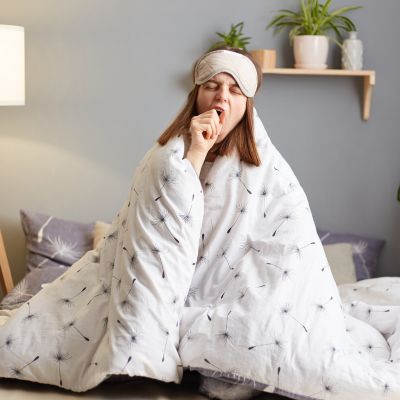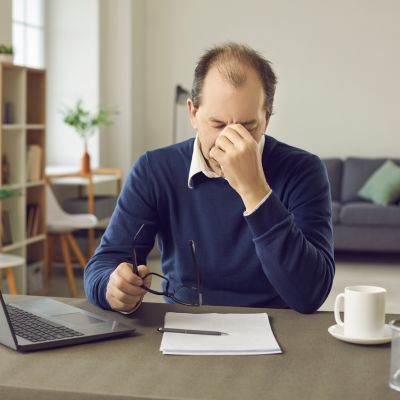You know that a poor night’s sleep can affect your entire day. It can leave you feeling tired, making it hard to concentrate at work or at school. It can also cause you to wake up on the “wrong side of the bed,” affecting your attitude. With all the ways that poor sleep affects us, it can lead some people to ask, “Does lack of sleep affect vision?” 
Lack of sleep can have a big impact on your vision and eye health. It can cause eyelid twitching, dry eye, and blurred vision in the short term. Over the long term, it can increase your risk of nearsightedness, diabetic retinopathy, and glaucoma. Fortunately, making small changes to your nighttime routine can improve the quality of your sleep and vision.
Does Lack of Sleep Affect Vision?
Does lack of sleep affect vision? Yes, lack of sleep affects your vision, eye health, and even overall health. You need your eyes and brain working at their best in order to see clearly, which means getting enough sleep each night. Poor sleeping habits hurt your ability to see clearly and even make your eyes feel less comfortable during the day.
Short-Term Effects of Poor Sleep on Your Eyes
The short-term side effects of sleep deprivation include:
- Eyelid Twitching
- Dry eye
- Blurred vision
- Itchy eyes
- Dark circles under your eyes
Getting a good night’s sleep will do wonders for the daily health and comfort of your eyes. Quality sleep nourishes your eyes and ensures that they get the rest that they need throughout the night. Sleep helps your eyes feel more comfortable, see more clearly, and even look better throughout the day.
Long-Term Effects of Poor Sleep on Your Eyes
Lack of sleep can lead to long-term eye problems, as well. Failing to get a good night’s sleep on a regular basis can increase your risk of vision problems such as:
- Nearsightedness
- Diabetic retinopathy
- Glaucoma
Nearsightedness (myopia) occurs mostly during childhood and adolescence. According to one study, kids ages 12 to 19 who got less than 5 hours of sleep per night were 41% more likely to develop nearsightedness than kids who got more than 9 hours of sleep a night. This correlation doesn’t mean that lack of sleep leads to nearsightedness, but that they may be connected.
Diabetic retinopathy (DR) damages blood vessels in the eye and can lead to vision loss. One study found that diabetics face a greater risk of the condition when they get too much or too little sleep. Men may face a higher risk of DR than women when they have poor sleep habits. The study found seven to seven and a half hours of sleep to be the ideal amount for diabetics.
Glaucoma is usually caused by high pressure in the eye. Over time, this pressure damages the optic nerve and eventually leads to vision loss. The cause isn’t clear yet, but one study of glaucoma patients over the age of 40 found that people who slept less than three hours or more than 10 were three times more likely to suffer from optic nerve damage than those who slept around seven hours a night.
Sleep Apnea and Your Eye Health
Poor sleeping habits aren’t the only sleep-related risk factor for glaucoma. According to the American Academy of Sleep Medicine, sleep apnea is another risk factor for the disease. Sleep apnea causes you to stop breathing while you sleep. This can cause you to wake up multiple times per night, interrupting your sleep and leaving you feeling unrefreshed in the morning.
It can be difficult to tell if you suffer from sleep apnea since it occurs while you’re sleeping. Fortunately, your eye doctor may be able to spot the signs of sleep apnea during your next eye exam.
Signs of sleep apnea include changes in your:
- Eyelids
- Retina
- Vision
Treating your sleep apnea may also reverse the effects it has on your eyes. Be sure to follow good sleep hygiene so you can wake up refreshed and ready to take on the day.
Tips for Getting a Good Night’s Sleep
Getting a good night’s sleep isn’t as easy as it used to be. Responsibilities and technology like smartphones demand our constant attention, making it hard to properly wind down at night. On the positive side, making small changes to your nighttime routine can help you fall asleep faster and wake up feeling energized.
To ensure a good night’s rest, make sure that you:
- Keep your bedroom dark, quiet, and cool (close to 65 degrees)
- Don’t have any electronics in your bedroom
- Are physically active earlier during the day
- Follow a routine before bed that helps you relax and unwind
- Wait to go to bed when you’re actually tired
Avoid these habits so that you fall asleep more easily:
- Drinking caffeine less than eight hours before going to bed
- Drinking alcohol at night, which can affect your breathing
- Smoking, which is a stimulant just like caffeine
- Eating late-night meals, which raises your blood sugar
- Napping after 3 P.M.
Following these sleeping tips will help protect your vision and overall health. However, continued trouble sleeping may point to a bigger issue than sleep hygiene. Talk to your doctor if you are still finding it difficult to fall asleep. They may prescribe a sleep study to see if there’s a deeper problem at work interfering with your sleep.
Is lack of sleep interfering with your vision and the comfort of your eyes? Click here to schedule your appointment!
Does lack of sleep affect vision? Yes, and in a number of ways. Over the short term, you may experience blurred vision, itchy eyes, and dark circles under your eyes. Possible long-term effects include higher risks of nearsightedness, diabetic retinopathy, and glaucoma. You can potentially avoid these side effects by making positive changes to your nighttime routine.
Hardin Valley Eyecare & Optical has been serving Knoxville since 2009. Located at 10904 Spring Bluff Way, you can schedule an appointment online or give us a call at (865) 888-0892.





